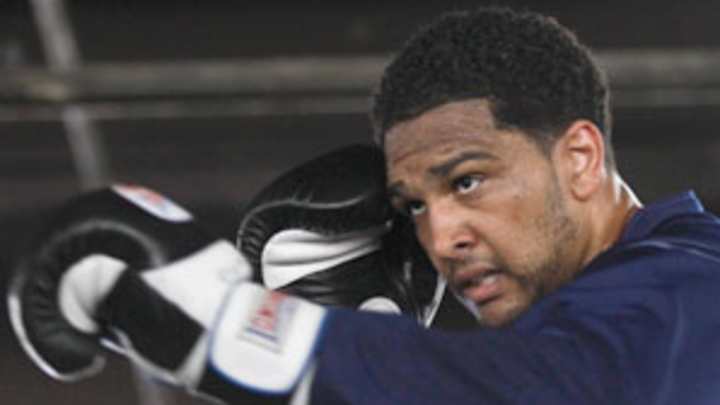Former quarterback Breazeale took untraditional path to Olympics

"It's definitely a little crazy," Breazeale said. "In my wildest dreams, I never expected this."
In the spring of 2008, Breazeale was doing what many graduating major college athletes do: Attempting to play professionally. He went undrafted, but received feelers from teams in the NFL and Canada. So when he got a phone call from a recruiting coordinator representing the All-American Heavyweights, a program that is attempting to rebuild American heavyweight boxing, offering him an opportunity to try out, he passed.
"I told him, 'No way,'" Breazeale said. "I'm finishing college, I'm getting my degree, I'm trying to play football. I didn't want to do that."
Breazeale got his degree, but football never panned out. He was invited to work out with the Giants and Panthers but was let go before training camp. He had an offer to join the CFL's B.C. Lions but his wife, Christina, was pregnant and he didn't want to leave her.
Instead he went home, back to Alhambra, Calif., where he continued to work out. It was there that he got another call from the recruiting coordinator, asking him if he would reconsider. This time, Breazeale decided to accept the offer.
"I was working out on a daily basis anyway," Breazeale said. "I just thought this might help me stay in shape."
Breazeale impressed in the workout, and in the fall of '08 was invited to join the program in Carson, Calif. It didn't take long for him to feel out of his element.
"I was so awkward," Breazeale said. "I thought my power hand should have been up front; for the first few days I tried to fight southpaw. It was a very uncomfortable feeling."
The AAH is divided into four camps. Newcomers start in the green camp, where they are taught proper footwork and technique. They spar a little, and towards the end are competing in short, three- or four-round fights. Those that do well are moved up to the bronze camp, where the training is enhanced and they begin competing in regional and national tournaments. The best move up to silver, where they are entered into the national championships, with the expectation of finishing in the top three. At the next level, gold, they are expected to win. Advancing takes about three months, and not everyone makes it. Of the 20 or 30 who begin in the green camp, only three or four make it to gold.
"The program really is trying to take a sport from the 20th century to the 21st century," said Michael King, the founder of All-American Heavyweights. "Boxing is the only sport that doesn't use the great breakthroughs in physical therapy, strength therapy and preventative medicine. We use the technical advances in video and had a team of cooks prepare every meal he had. We got him in the best shape of his life."
As reluctant as Breazeale was to box initially, he committed quickly. The football season had already started, so that was out. He had hoped to use his degree in criminal justice to work in probation, but the background check in California could take up to a year. Boxing was what he was left with.
"Football never kicked in, the job never kicked, so I had this," Breazeale said. "I became a full-time boxer."
As a quarterback, Breazeale was used to taking hits. But it didn't take long to realize those hits did little to prepare him for a punch.
"As a quarterback, every time you snap the ball there is a chance you are going to get hit," Breazeale said. "But that's a lot different than seeing a punch coming and getting hit in the face. I would rather get blindsided by a defensive end than take a big right hand from a good boxer."
Still, Breazeale adjusted well. His raw power carried him through his first few fights, and, slowly the technique started to develop. In 2011, he finished third at the National Championships. This year, he won it.
To medal in London, Breazeale -- who will face Russian Magomed Omarov on Wednesday -- will have to beat some fighters who have boxed all their lives. He understands he is at a disadvantage, but believes that his conditioning and his constantly evolving style will surprise people.
"Every time i get in the ring, I learn something new," Breazeale said. "I'm constantly changing things. I'm very good at adapting. If I get in the ring and the first round isn't going so well, in the second round I'm a completely different boxer. Usually a lot of my fights, if they do go the distance, I win them in the third round. Heavyweights aren't all in the best of shape. I can go hard every round."

Chris Mannix is a senior writer at Sports Illustrated covering the NBA and boxing beats. He joined the SI staff in 2003 following his graduation from Boston College. Mannix is the host of SI's "Open Floor" podcast and serves as a ringside analyst and reporter for DAZN Boxing. He is also a frequent contributor to NBC Sports Boston as an NBA analyst. A nominee for National Sportswriter of the Year in 2022, Mannix has won writing awards from the Boxing Writers Association of America and the Pro Basketball Writers Association, and is a longtime member of both organizations.
Follow sichrismannix